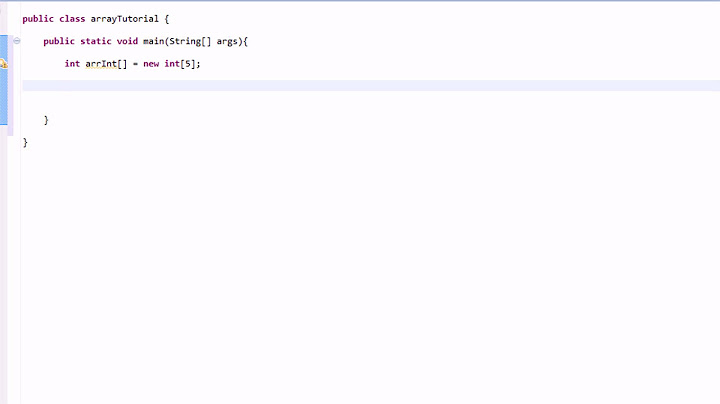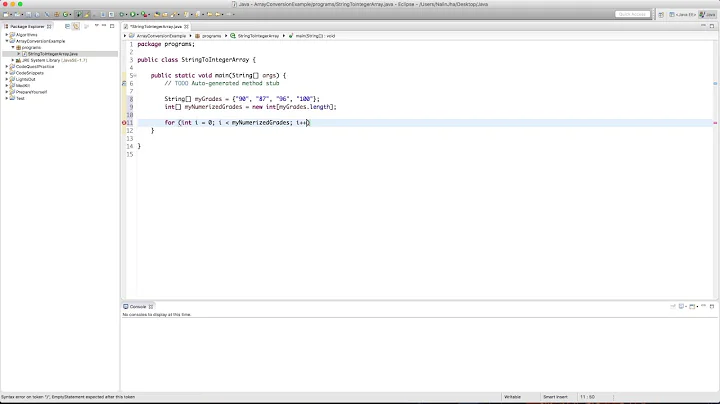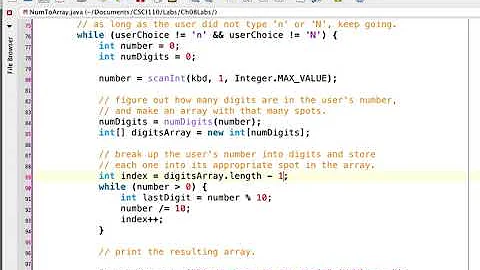Converting an int array to a String array
Solution 1
int[] nums = {5,1,2,11,3}; //List or Vector
Arrays.sort(nums); //Collections.sort() for List,Vector
String a=Arrays.toString(nums); //toString the List or Vector
String ar[]=a.substring(1,a.length()-1).split(", ");
System.out.println(Arrays.toString(ar));
UPDATE:
A shorter version:
int[] nums = {-5,1,2,11,3};
Arrays.sort(nums);
String[] a=Arrays.toString(nums).split("[\\[\\]]")[1].split(", ");
System.out.println(Arrays.toString(a));
Solution 2
Use a Stream which is available from Java 8. To get a Stream instance with "list" of ints:
- For
int[]-
IntStream intStream = Arrays.Stream(nums);or -
Stream<Integer> intStream = Arrays.Stream(nums).boxed();if you need the same class as bottom one.
-
- For any classes with
Collection<Integer>interface (ex.Vector<Integer>,List<Integer>)Stream<Integer> intStream = nums.stream();
Finally, to get a String[]:
String[] answer = intStream.sorted().mapToObj(String::valueOf).toArray(String[]::new);
Solution 3
Can I use a while loop instead?
@Test
public void test() {
int[] nums = {5,1,2,11,3};
Arrays.sort(nums);
String[] stringNums = new String[nums.length];
int i = 0;
while (i < nums.length) {
stringNums[i] = String.valueOf(nums[i++]);
}
Assert.assertArrayEquals(new String[]{"1","2","3","5","11"}, stringNums);
}
Using JUnit assertions.
Sorry, I'm being flippant. But saying you can't use a for loop is daft - you've got to iterate over the list somehow. If you're going to call a library method to sort it for you (cf Collections.sort()) - that will be looping somehow over the elements.
Solution 4
Simple solution using Guava:
public List<String> toSortedStrings(List<Integer> ints) {
Collections.sort(ints);
return Lists.newArrayList(Iterables.transform(ints,
Functions.toStringFunction()));
}
Obviously, this solution (like any other) is going to use loops internally, but it gets it out of the code you have to read. You could also avoid changing the order in ints by passing the result of Ordering.natural().sortedCopy(ints) to transform instead of using Collections.sort first. Also, the Lists.newArrayList part is not necessary if you don't need to be able to add new elements to the resulting list.
The shortened version of that method body, with static imports:
return transform(Ordering.natural().sortedCopy(ints), toStringFunction());
Solution 5
If you use a TreeSet, I have a (longish) one-liner for you (assuming items is the TreeSet):
final String[] arr =
items.toString() // string representation
.replaceAll("\\D+", " ") // replace all non digits with spaces
.trim() // trim ends
.split(" "); // split by spaces
Test code:
Set<Integer> items = new TreeSet<Integer>(Arrays.asList(5, 1, 2, 11, 3));
// insert above code here
System.out.println(Arrays.toString(arr));
Output:
[1, 2, 3, 5, 11]
EDIT:
OK, here is a different version that works with the int array directly. But unfortunately it's not a one-liner. However, it does keep duplicates and it's probably faster
EDIT again:
Bug fixed and negative numbers supported, as requested:
EDIT once more: only one regex pass and no trim
final int[] in = { 5, 1, 2, 11, 3, 2, -5 }; // with duplicate
Arrays.sort(in);
final String[] out =
Arrays.toString(in)
.replaceAll("(?:\\[?)([-\\d]+)(?:\\]?)", "$1") // just remove [ and ]
.split("\\s*,\\s*"); // split by comma
System.out.println(Arrays.toString(out));
Output:
[-5, 1, 2, 2, 3, 5, 11]
Or completely without regex (apart from split()), but with one more step added:
final int[] in = { 5, 1, 2, 11, 3, 2, -5 }; // with duplicate
Arrays.sort(in);
final String stringRep = Arrays.toString(in);
final String[] out =
stringRep.substring(1, stringRep.length() - 1).split("\\s*,\\s*");
System.out.println(Arrays.toString(out));
Output:
[-5, 1, 2, 2, 3, 5, 11]
Update: stripped whitespace from my last two solutions, hope you're happy now :-)
Related videos on Youtube
Comments
-
dev4life almost 2 years
So I have this "list" of ints. It could be a
Vector,int[],List<Integer>, whatever.My goal though is to sort the ints and end up with a
String[]. How the int array starts out as is up in the air.ex: Start with:
{5,1,2,11,3}End with:String[] = {"1","2","3","5","11"}Is there anyway to do this without a for loop? I have a for loop now for collecting the ints. I would rather skip doing another for loop.
-
Darin Dimitrov over 13 yearsPlease retag your question with the appropriate language.
-
Paul Tomblin over 13 yearsWhy do you want to avoid for loops? Any solution that anybody comes up with will have some sort of loop, even if it's hidden behind a method call.
-
ColinD over 13 years@Rudi It may have been edited within 5 minutes of being posted, in which case the edit wouldn't show up.
-
Javid Jamae over 13 yearsTo treat your fear of multiple for loops, I would seek professional help. Start by reading Refactoring (Martin Fowler) and Working Effectively With Legacy Code (Michael Feathers)...
-
-
gpeche over 13 yearsOh, yes it is. I don't use
Vectors that much as they are obsolete, so i didn't know they becameLists. I remembered when you would iterate them withVector.elements()(long ago). -
ColinD over 13 yearsThis won't work correctly for any array or list with more than 1 of the same element.
-
 missingfaktor over 13 years+1 @ColinD.
missingfaktor over 13 years+1 @ColinD.TreeSetwill sort the numbers for you but it will also remove the duplicates, which is not what is intended. -
 Sean Patrick Floyd over 13 yearsI know, but nobody said anything about keeping dupes
Sean Patrick Floyd over 13 yearsI know, but nobody said anything about keeping dupes -
ColinD over 13 yearsLists and arrays (mentioned in the question) keep duplicates, so I feel like it's kind of implicit.
-
 Sean Patrick Floyd over 13 yearsVector, Hashtable, StringBuffer: These classes are all somewhat obsolete but folks keep using them. New folks, too. I wonder where they learn that...
Sean Patrick Floyd over 13 yearsVector, Hashtable, StringBuffer: These classes are all somewhat obsolete but folks keep using them. New folks, too. I wonder where they learn that... -
 Sean Patrick Floyd over 13 yearsthat's cool!! (if I had any remaining votes I'd upvote it) :-)
Sean Patrick Floyd over 13 yearsthat's cool!! (if I had any remaining votes I'd upvote it) :-) -
 user85421 over 13 yearslittle changes needed for correctly handling negative numbers, and there is an undefined
user85421 over 13 yearslittle changes needed for correctly handling negative numbers, and there is an undefinedarrbeing used instead ofin... -
 missingfaktor over 13 years@seanzier: Thanks, much appreciated! :)
missingfaktor over 13 years@seanzier: Thanks, much appreciated! :) -
Emil over 13 years@seanizer: No need to handle the number's type in regex just remove the opening and closing braces and split with ", ".
-
Emil over 13 years@seanizer:I have never heard StringBuffer to be obsolete.Can you refer to any article?
-
gpeche over 13 years
StringBuilderobsoletesStringBufferfor most cases. download.oracle.com/javase/1.5.0/docs/api/java/lang/… -
 Sean Patrick Floyd over 13 years@emil true, but I don't think that's any simpler
Sean Patrick Floyd over 13 years@emil true, but I don't think that's any simpler -
Emil over 13 yearsCheck my answer.I told so because you wouldn't have to handle negative values.
-
Emil over 13 yearsAlso leave a space after ',' other wise all numbers will have an extra space.
-
 Sean Patrick Floyd over 13 years@emil, ok here we go again. whitespace is now stripped
Sean Patrick Floyd over 13 years@emil, ok here we go again. whitespace is now stripped -
dev4life over 13 yearsI think this could be the answer. I didn't want to interate through the list a second time because I'm already iterating to get the int list. Thank you.
-
dev4life over 13 yearsBecause I already loop to get the list. Thanks for playing though.
-
Emil over 13 yearsif your concerned about speed then its better to use the normal for loop once more because in Arrays.toString() they are using a for loop.Check the source(docjar.com/html/api/java/util/Arrays.java.html) But if you just want your code to look small then ok,you can use the above code or another option is just write small function to sent an int[] as input and return String[] array as output.
-
user unknown about 12 yearsThere a some problems with your code. 1. of all, nobody uses a blank in a++ while it might work. Don't try to be individual in coding style! 2. What is yourInt, someNumber? They don't exist in the question, and you don't declare or explain them. 3.
castingis very narrowed defined term in Java. There is no cast from String to Int, because Int isn't a subclass of String. 4. nobody usess[a]=String.valueOf (yourInt);, buts[a] = "" + yourInt;. 5. Why the intermediate assignment to stringName? 6. Why violation of coding styles and using StringArrayName[a] instead of stringArrayName[a]? -
user unknown about 12 years7. What a name, stringArrayName! While it is an array of ints as names. 8. no indentation. All those problems hide your simple, but elegant, if applyable, idea.
-
Chance over 9 yearsThe "[\[\]]" is a regular expression, right? How did you know which one to use, and what exactly is it dictating?
-
Zach Lysobey over 8 yearsDon't think Java has the
varkeyword. This looks like JavaScript -
FindOutIslamNow almost 6 yearsThe idea is to use
Arrays.toString






